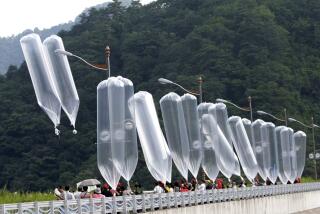The Resilient Calm of Kim Dae Jung
South Korean President Kim Dae Jung, in the United States this week to confer with Bill Clinton before the American presidentâs coming state visit to China, is an anti-communist. But he is not anti-China. This upset victor in last Decemberâs Korean election respects Chinaâs leaders and they respect him. While over the years Kimâs political potential was underestimated by South Koreaâs closest ally, the United States, that was never the case with China, North Koreaâs leading ally. Even when the soft-spoken career reformer, whether in exile or in opposition, had been all but written off as yesterdayâs man by the West, the Chinese, covering their bets in the then-unlikely event of his political resurrection, would receive him with all the red-carpet pomp reserved for world leaders. So when Kim, on his state visit here, makes the rounds of Congress this week, this veteran anti-communist will not sound remotely like an anti-China crusader. On the contrary, he would counsel America (if anyone asked) to develop a healthy though not subservient respect for the emerging Asian superpower and to spurn unnecessary quarrels, without abandoning our principles, self-respect or self-interest. In effect, he would counsel us to use our brains, not flex our muscles. This is not bad advice. But this is not always Americaâs way.
There is something special about Kim, who instead of having been permanently impaired by torture during past imprisonments was transformed by the gruesome experience into a man of phenomenal resilience, not unlike some current Chinese leaders who survived the insanity of the Cultural Revolution and rose to the top. Resilience is a quality that South Koreaâs leader certainly will need, not only in coping with the countryâs failing economy but also in dealing with a still-Stalinist and armed-to-the-teeth North Korea.
Resilience is a quality revered by other Asian leaders. As Singapore Cabinet member George Yeo, a well-known Asian intellectual, put it during an international Asia Society conference in Los Angeles last week, âWhen the whole world is in a swirl, you need someone to lead who has deep calm inside. Precisely because of his heroic personal experiences, Kim Dae Jung has deep spiritual strengths.â
Kim also has a fine international political ear. Earlier last week in Seoul, he reiterated what everyone knew to be his basic instinct: that South Korea and the U.S. now need to ease economic sanctions on North Korea in order to peck away at the Northâs menacing isolation. It was no coincidence that, only days later, the Council on Foreign Relations went public with a bold call for new action on the Korean peninsula. The council, the East Coast establishmentâs foreign policy college of cardinals, issued an unusual, politically risky report that could help bolster Kimâs position both in Korea and in the United States. Based on more than a year of careful study by American experts of all political stripes, it urges a sleepy Washington to lob a one-more-time peace offensive at the North by loosening economic sanctions (generally a no-no with U.S. conservatives), stepping up economic aid (not exactly popular in the U.S., even with liberals), widening Washington-Pyongyang contacts and consulting more closely with China--and eventually Japan and Russia. This valuable and, one hopes, influential report concludes: âNorth Korea should occupy a central place in the ongoing strategic dialogue between Washington and Beijing and should be a major topic when President Clinton visits China at the end of June.â
Kim can help with China only so much, of course. Although he is held in high esteem in Beijing, Tokyo, Washington and Europe (and perhaps, for all anyone knows, in Pyongyang, too), he has serious problems at home. Like Clinton, he controls only his own executive branch and not his legislature. One difference, of course, is that Clinton is sitting pretty on the best U.S. economy in memory and Kim uncomfortably on the worst Korean one in decades. Singaporeâs Yeo and others in Asia worry that by the time the current regional financial crisis has played out, the experience will have proved as searing a memory for todayâs generation as World War II was for yesterdayâs. Worse yet, the Asian financial crisis comes as America is entering a domestic crisis on China.
For his part, Kim maintains a modest perspective on his potential as a Sino-American shuttle diplomat. How much can one man do? As the late Oxford don Isaiah Berlin once wrote, individual leadership is only one factor on the world stage: âAt crucial moments, at turning points, when factors appear more or less equally balanced, chance, individuals and their decisions and acts, themselves not necessarily predictable--indeed, seldom so--can determine the course of history.â Itâs true that difficult times are nothing new for a man like Kim, who can regard even torture as character-enhancing. But a bad economy can tie a leaderâs hands at the very moment he needs the greatest possible freedom of movement. Regarding Korea, that turning point is surely coming nearer.
More to Read
Get the L.A. Times Politics newsletter
Deeply reported insights into legislation, politics and policy from Sacramento, Washington and beyond. In your inbox three times per week.
You may occasionally receive promotional content from the Los Angeles Times.










